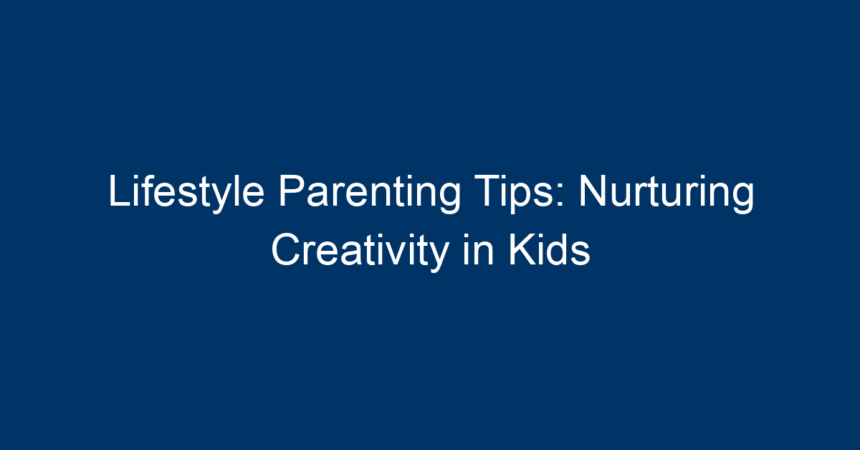In today’s fast-paced, technology-driven world, nurturing creativity in kids is more important than ever. As parents, we often find ourselves focused on structured activities and academic achievements, but fostering creativity can provide our children with the tools they need to succeed in life. In this article, we’ll explore practical lifestyle parenting tips that can help cultivate a creative mindset in your children, encouraging them to think outside the box while also promoting their emotional well-being.
Understanding the Importance of Creativity
The Role of Creativity in Development
Creativity is not just about art and music; it’s a critical component of cognitive, emotional, and social development. Creative kids tend to have better problem-solving skills, higher self-esteem, and improved resilience. Encouraging creativity allows children to express their thoughts and emotions freely, helping them navigate the complexities of the world around them.
Creativity as a Lifelong Skill
In a rapidly changing society, creativity remains one of the most valuable skills. Jobs of the future will demand innovation, adaptability, and original thinking. By nurturing creativity early on, parents equip their children with essential skills that will serve them throughout their lives.
Lifestyle Parenting Tips for Nurturing Creativity
1. Create a Stimulating Environment
Design a Creative Space
Set up a dedicated area in your home where your child can unleash their creativity. This space should be filled with art supplies, building materials, or musical instruments. Encourage your child to use this area freely without the fear of making a mess. A stimulating environment allows children to explore their interests fully.
Incorporate Nature
Exposure to nature can spark creativity. Take daily walks in parks, plan weekend excursions to the countryside, or even maintain a small garden. Nature’s beauty and unpredictability inspire exploration and imagination.
2. Encourage Artistic Expression
Diverse Artistic Activities
Expose your children to various forms of artistic expression. From painting and sculpting to dance and drama, diversifying creative activities helps children understand that creativity can manifest in multiple ways. Encourage them to try new things and appreciate different art forms.
Celebrate Mistakes
Teach your children that mistakes are essential to the creative process. A child’s fear of failing can stifle their imagination. Encourage them to view errors as opportunities for growth rather than setbacks. This change in perspective can unlock their potential.
3. Foster Open-ended Play
Limit Screen Time
While technology has its benefits, excessive screen time can curtail creative thinking. Enforce boundaries on digital devices and encourage open-ended play instead. Toys like building blocks, dolls, or art supplies can stimulate imaginative play and critical thinking.
Role-Playing Games
Activities that encourage kids to create stories and characters can enhance their imaginative capabilities. Whether it’s through dress-up games, puppet shows, or pretend play, role-playing allows children to explore different perspectives and scenarios.
4. Promote Problem-Solving Skills
Encourage Questions
Curiosity drives creativity. When your child asks questions, promote a sense of wonder by allowing them to explore the answers. Engage in discussions that challenge their thinking and require them to find solutions.
Hands-on Projects
Incorporating hands-on projects, such as science experiments or DIY crafts, fosters problem-solving skills. These activities encourage children to think critically and explore alternative solutions.
5. Introduce Them to Creative Thinkers
Watch Documentaries and Read Books
Expose your children to the lives of creative thinkers, artists, and entrepreneurs through age-appropriate documentaries or books. Learning about influential figures encourages kids to innovate and find their unique voice.
Creative Workshops and Classes
Enroll your children in workshops or classes that focus on creative skills. From pottery and graphic design to coding and filmmaking, structured learning environments can foster creativity through guided exploration.
6. Value Their Creative Work
Show Genuine Interest
When your child creates something, whether a piece of artwork or a story, show genuine interest and enthusiasm. Ask them about their creative process and what inspired them. This acknowledgment gives them the confidence to continue expressing themselves.
Display Their Work
Create a display area for your child’s creative projects. Showcasing their work not only validates their efforts but also encourages them to continue exploring their creativity.
Creating a Balanced Lifestyle
While nurturing creativity is essential, maintaining a balanced lifestyle is crucial for holistic development. Integrating creativity into daily routines can enhance family dynamics and promote emotional well-being.
Family Creative Time
Set aside dedicated time each week as a family for creative activities, such as art night, cooking experiments, or even family storytelling sessions. This strengthens relationships while fostering a culture of creativity.
Mindfulness and Relaxation
Incorporating mindfulness exercises into the routine can help children feel more relaxed and open to creative thinking. Teach them simple meditation techniques or encourage journaling to foster self-reflection and clarity of thought.
Conclusion
Nurturing creativity in kids is one of the most rewarding aspects of lifestyle parenting. By incorporating lifestyle parenting tips that promote artistic expression, problem-solving skills, and open-ended play, you empower your children to think independently and approach challenges with creativity. Remember that creativity is a journey, not a destination; embrace the process and champion their imaginative efforts.
Actionable Insights
- Design a Creative Space: Dedicate an area for artistic exploration.
- Limit Screen Time: Encourage more open-ended play.
- Encourage Questions: Foster curiosity and problem-solving.
- Show Interest in Their Work: Validate their efforts and creativity.
- Engage in Family Activities: Create a culture of creativity together.
By following these tips, you can raise confident, imaginative children ready to take on the world with creativity and resilience. Embrace the beauty of creativity in parenting, and you’ll watch your children thrive in every aspect of their lives.




